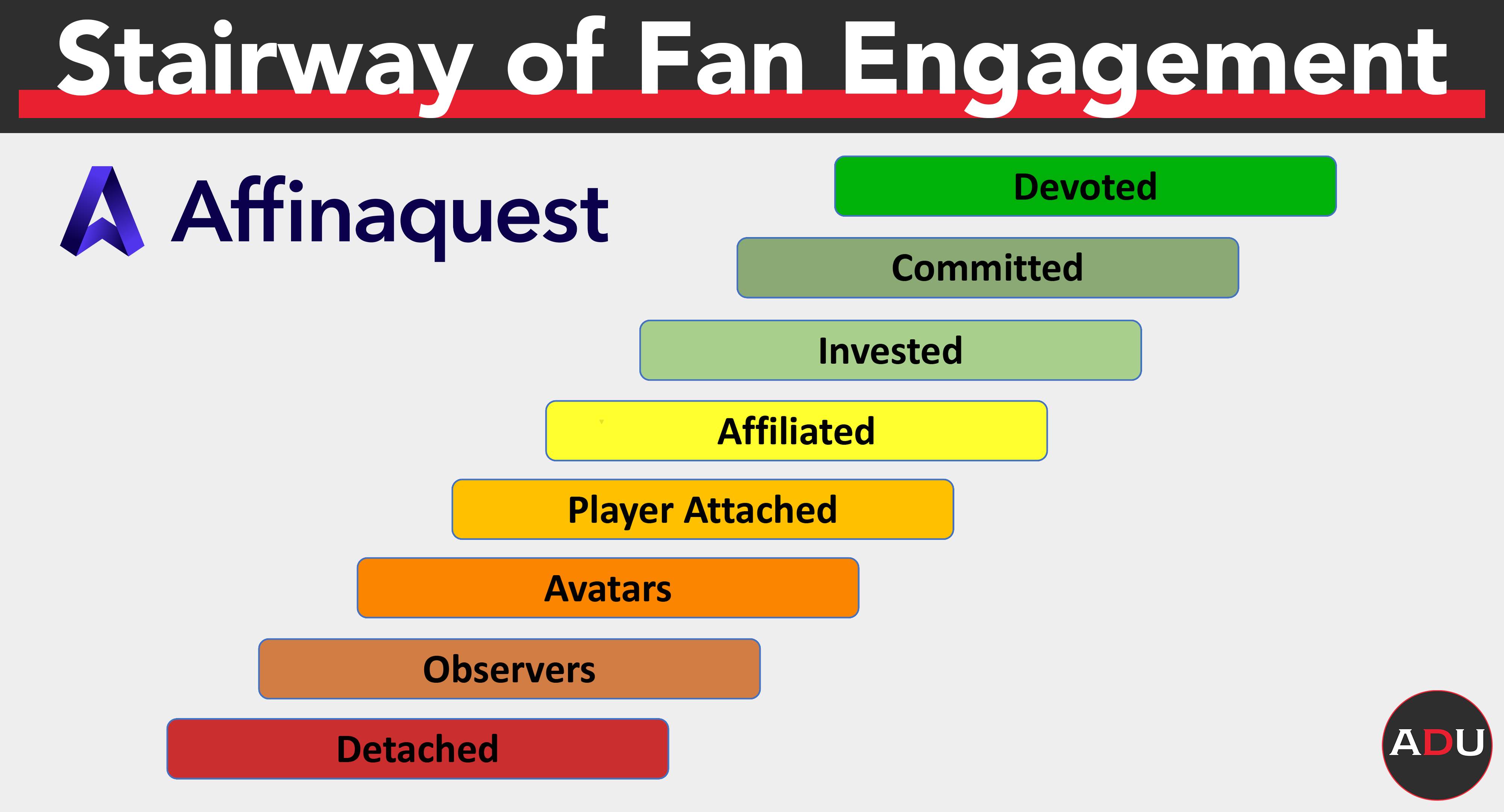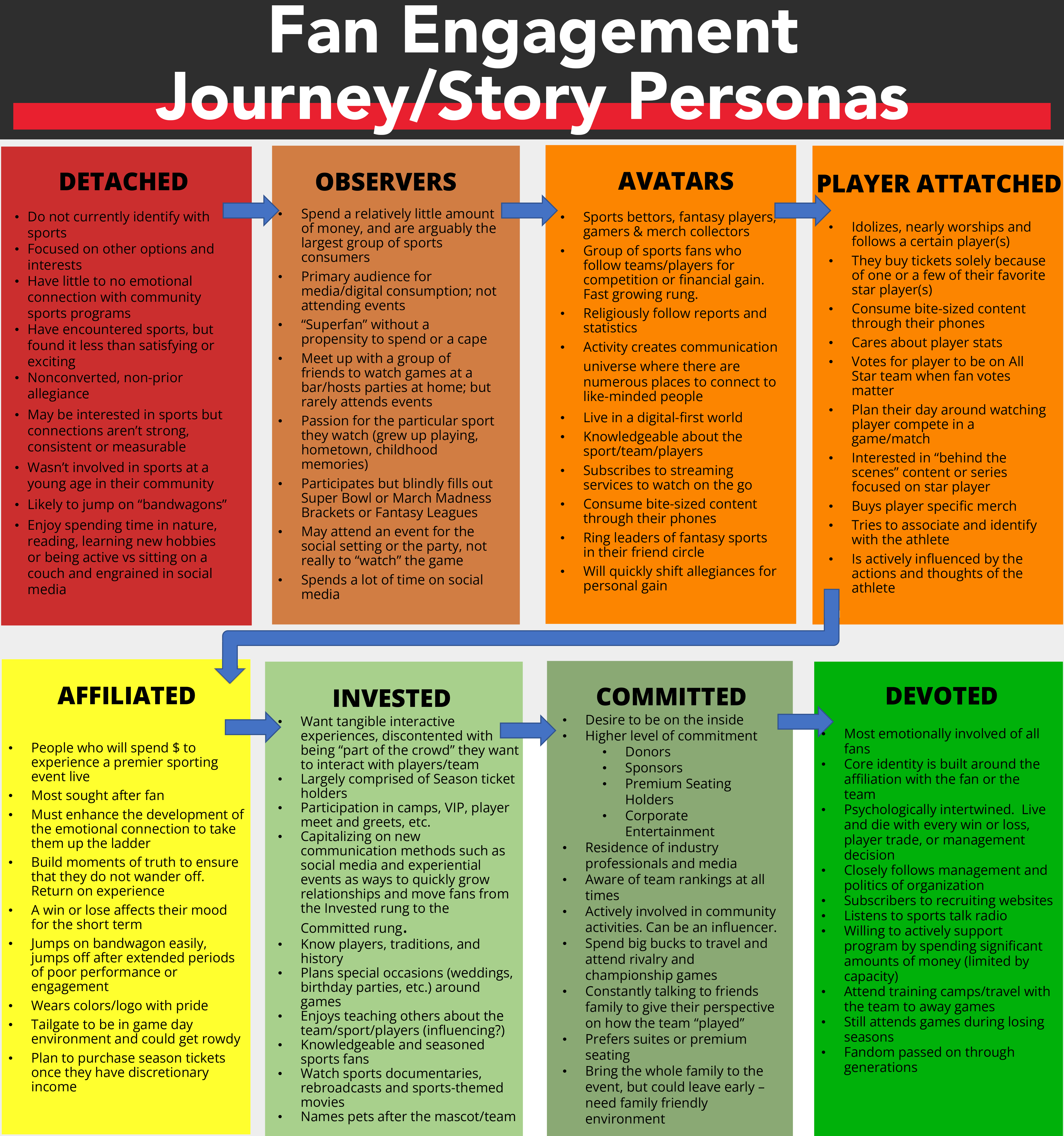In case you haven’t noticed, the future is here. Technological change impacts every aspect of your life.
Cars are driving themselves, computers fit in our pockets, and breaking news is now a tweet not a newspaper headline.
You’re saying: That’s very interesting, but what’s your point? Given the pace of change in our society and the fact athletic departments are beset by declining ticket sales and donations, why are athletic departments still approaching the problem using the methods of yesteryear?
That is the very challenge Affinaquest solves, and for those who have partnered with them – the company is working with over 40 of the 65 Power 5 schools – the results are tangible and unambiguous: Those utilizing Affinaquest’s suite of solutions, are maximizing season ticket renewals, increasing new ticket sales, and driving revenue across all channels.
Before we get to how this works, let’s take a look at how Affinaquest approaches fan affinity.
THE AFFINAQUEST ENGAGEMENT LADDER
It is crucial to first understand the various levels of fan engagement. Affinaquest illustrates them as steps on a stairway.

As you can see – and as you undoubtedly well know – fans are not born with face paint and foam fingers nor do they walk into your ticket office and request season tickets for life. Every one of them is different, but for the purposes of organization, Affinaquest has broken them down into eight buyer personas, from least to most engaged. The progression is detailed in the chart below.

It is critical to understand which fans fall into which categories before you engage with them, according to Affinaquest EVP for Collegiate Athletics, Steve Hank. “To help your fan take the next step up the ladder, you have to understand them first. You have to personalize your approach based upon the current step they are on to guide them on their journey.”
It would be imprudent, Hank explained, to approach, for example, a recent young alumnus/alumna in the Observer category with an offer to buy season tickets. For one, they are just starting their careers and their financial resources may not allow for such an investment. For another, they haven’t shown a propensity to engage on such a high level. Instead, Hank believes departments should ask themselves, “How do get some to stop watching and start be fan from a seat for one game? How do I get the fan who comes to one game a year to buy a mini-plan? How do I get the fan who comes to three games a year to become a season ticket holder? You have to approach the right people with the right message at the right time.”
One SEC athletic department explained how their department used Affinaquest’s solutions to add apparel consumers to their sales database. “We know how they were interacting with us, whether that’s through email engagement, or whether that’s through making a ticket purchase and coming to a game into the point we were able to kind of boil down and say, ‘Hey, these leads have been worth hundreds of thousands to us in the form of donations or ticket purchases. So we’ve been tracking that, and it’s taken our database from a relatively small database four or five years ago to upwards of one million.” Another SEC administrator described the results as if “revenue was falling out of the sky.”
HOW TO DO IT: THE THREE-PRONGED APPROACH
University athletic departments are still part of university ecosystems whose attendant bureaucracies can stifle agility, even when decisions are made quickly. For example, some universities are not allowed to pay sales representatives incentives or commissions. For others, creating a sales program is laborious and unwieldy.
Universities for so long have banked upon the large pools of affinity that they have with their fan bases to drive ticket sales and attendance. The thinking was, ‘Throw open the doors and people will come.’ The reality was they lulled themselves into a false sense of security and continued to treat their fan bases in an homogenous manner, which simply does not work in this era of personalization – again: right people, right message, right time.
Companies use data to determine desires and market precisely to them. In order for athletic departments to do that, developing and implementing an effective data strategy is non-negotiable, and it requires these three components to work synchronously to drive outcomes: Structured Data, Actionable Systems and Data, and Data Insights.
Let’s take a look at each.
Structured Data
You must collect all the data you have in silos and clean, position, and structure your data to make it accessible and usable, thus allowing stakeholders to make decisions. Without having it all in one place and in a format in which you can utilize and analyze it, it does not work. In other words, if you start from a place of disorganization, your results will be similarly inconsistent and difficult to track.
“Using Affinaquest’s propensity and capacity modeling, we were able to tie back a ticket that was purchased to a football game in 2018 to a person who came into our system because they purchased a t-shirt,” said a SEC Administrator “We can then directly attribute that revenue to that lead source back to that merchandise purchaser.” That is not possible without structuring your data.
Actionable Systems and Data
Utilize tools such as CRM and Marketing Automation that enable your teams to execute and drive impact. This allows for the creation of personalized messaging and marketing campaigns to the fan. It meets their needs and delivers relevant, timely communication in an automated way, maximizing resources to drive ticket sales, attendance and donations.
One Big Ten administrator explained that Affinaquest’s propensity modeling allowed the department to identify individuals who weren’t purchasing season tickets but had similar profiles to those who were. “That allowed us to develop a list of ‘hot leads’ versus a list of 80,000, which can make it difficult to even pinpoint a place to start.” This allowed them to allocate their limited resources where they can have the greatest impact.
Data Insights
By extracting useful information (such as profile segmentation) and applying predictive analytics, you can know which of your fans are likely to take a certain action such as make a donation, purchase a ticket or upgrade tickets. You can also identify those who may be at risk of non-renewal.
With limited resources available, deploying those resources in the most effective way to maximize impact is essential. Predictive analytics are the true gamechangers for our industry. While many say they have predictive analytics, they do not have the true data infrastructure to deliver. Affinaquest does. They allow you to find new revenue opportunities by understanding and meeting the needs of your fans and constituents. They allow you to optimize and align your processes to drive maximum impact. By using your resources where they will generate the greatest impact, you will increase sales and renewals and the efficiencies of your team, thereby maximizing your return on investment.
These impacts are only possible by understanding your fans and utilizing data to develop personalized campaigns and customer service, like the one provided by that virtual assistant in the Philippines, that is designed to meet their specific needs. This drives customer satisfaction, thereby driving ticket sales and revenues.
“Before we had Affinaquest, this was an incredibly laborious process that required multiple spreadsheets and would take weeks to compile. Whereas now, with a Affinaquest, it’s on demand, so that’s where they’re providing the value and on the kind of the previous lifetime revenue.”
Benefits of Affinaquest’s Solutions and Predictive Analytics
- Find new revenue opportunities and maximize your revenue from current fans and constituents
- Identify the priority order in which you should pursue new opportunities and which current customers are at risk
- Optimize processes and performance
- Maximize the allocation of your sales and service resources
- Improve capacity and quality of fan and constituent interactions
- Call times are reduced due to knowledge that requires less assessment
- Improve collaboration and control
- Reduce risks
Athletic departments are aware that their use of data must become more sophisticated, and while senior level administrators have multiple skill sets – such as hiring coaches, managing university politics, negotiating student-athlete issues, academics and fundraising, just to name a few – university reporting structures are rarely, if ever, set up to allow for the kind of specialization required to fully optimize the very business processes that keep these enterprises afloat. That, however, is starting to change, and Affinaquest is leading the way because in case you haven’t noticed, the future is here.

